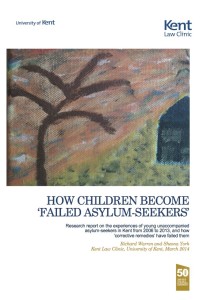- BY Jo Wilding

How children become failed asylum seekers
THANKS FOR READING
Older content is locked

A great deal of time and effort goes into producing the information on Free Movement, become a member of Free Movement to get unlimited access to all articles, and much, much more
TAKE FREE MOVEMENT FURTHER
By becoming a member of Free Movement, you not only support the hard-work that goes into maintaining the website, but get access to premium features;
- Single login for personal use
- FREE downloads of Free Movement ebooks
- Access to all Free Movement blog content
- Access to all our online training materials
- Access to our busy forums
- Downloadable CPD certificates
Kent Law Clinic has published a new report, How Children Become Failed Asylum Seekers, which needs to be read by anyone representing children in asylum cases. Taking the files of 25 “failed asylum seekers” who had arrived in Kent as children, they reviewed the decision making process of the Home Office, the legal representation and the Tribunal’s consideration of any appeal in each case, as well as seeking to identify any further legal action which could be taken.
The research team found that the majority of the young people had been refused on credibility or plausibility grounds, but that many of those findings arose out of processes which have now been disallowed. For example:
A number of our clients had experienced on-entry interviews carried out without a lawyer or responsible adult and sometimes before being allowed to wash, eat or drink. In some of the cases that initial interview had a specific negative impact on the case.
 The practice of interviewing children immediately on arrival has been changed in Kent to allow for rest and recovery following a report, Landing in Dover by the Children’s Commissioner for England. Questions asked about the substance of the claim without a responsible adult present can normally no longer be relied on to discredit a child applicant following AN (A child) and FA (A child) v SSHD [2012] EWCA Civ 1636. These are issues of procedural fairness, yet there has been no official review of children’s cases where adverse credibility decisions rested on evidence obtained in this way.
The practice of interviewing children immediately on arrival has been changed in Kent to allow for rest and recovery following a report, Landing in Dover by the Children’s Commissioner for England. Questions asked about the substance of the claim without a responsible adult present can normally no longer be relied on to discredit a child applicant following AN (A child) and FA (A child) v SSHD [2012] EWCA Civ 1636. These are issues of procedural fairness, yet there has been no official review of children’s cases where adverse credibility decisions rested on evidence obtained in this way.
Despite a recommendation from the Children’s Commissioner in 2012 against the use of telephone interpreters for any interview which will lead to an immigration decision, KLC’s evidence indicates telephone interpretation has continued for screening interviews, despite the use of “discrepancies” between screening interview, substantive asylum interview and witness statements to discredit an applicant’s account. Again this is a serious issue of procedural fairness which has not resulted in any review of the safety of asylum refusal decisions.
Sixteen out of twenty clients had been assessed as older than they claimed to be, though still as children, with two years being the most common discrepancy between claimed and assessed age, despite the widespread acceptance that age assessment cannot be effective to within two years. Anecdotally, Afghan children more often faced assessment than Eritrean children.
Concerningly, the Home Office decision maker routinely accepted the one-page summary of age assessment conclusions without seeing the full assessment to consider whether it was Merton-compliant or sustainable. Worse, the assessments were rarely challenged among the sample group by their legal representatives.
The closure of Refugee and Migrant Justice in July 2010 had caused particular problems, with a number of those in the KLC sample having had two, three or more legal representatives or periods with no representative.
Failing to appeal the first refusal of asylum, because the child had been given discretionary leave, was a common problem, with ten out of twelve children who had the right to appeal at that stage not doing so. This has significant disadvantages for the child and all legal representatives working with children should be advising them to appeal against the first refusal of asylum.
Some firms had “merits failed” child clients for disgraceful reasons, leaving them without legal representation in circumstances sometimes clearly contrary to the guidance for granting legal aid. The report also identified a number of common problems in case preparation or apparently lazy preparation based on the expectation that the child would in any event get discretionary leave (now called UASC leave).
This is not the first report to express concern about the way that not only the Home Office but also legal representatives treat asylum claims by children. Anyone taking on children’s cases needs to make sure they have the right training and skills to do so.
[downloads ids=”17797″]

